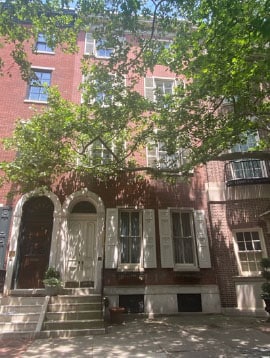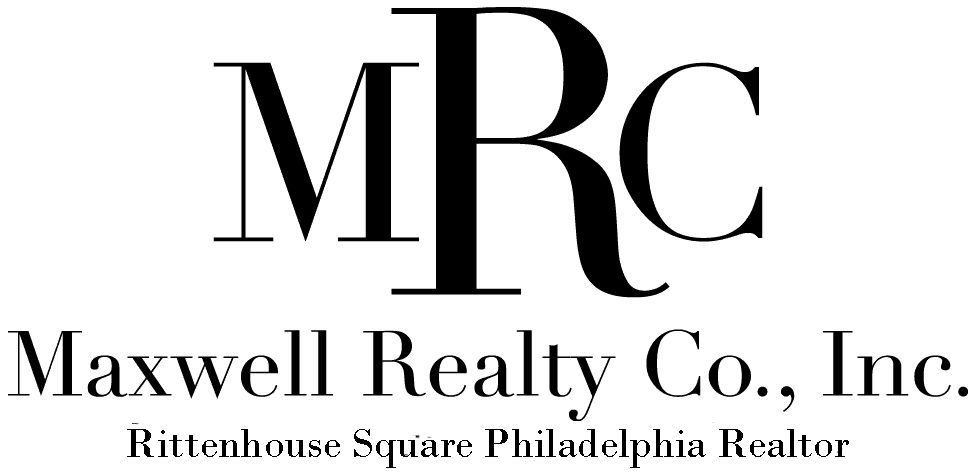Making an informed decision when there is economic unclarity
Rittenhouse Square Realtor Maxwell Realty, LLC is committed to empowering our clients with current news, market trends, and insider information to make the best decision for their home-buying scenario. Making the decision to buy a home should feel exciting, affordable, and well-informed. You need an experienced, reputable realtor. Maxwell Realty’s 50-plus years of expertise in working with Philly’s market trends and neighborhood shifts fosters savvy decision-making, whether you ultimately determine whether now is the time to buy, or later.
When is the Right Time to Buy a Home?
 Consumers and local real estate agents are inundated with an incredible amount of information that sometimes appears to be conflicting due to the timing of market volatility, inflated interest rates, and the marked reactivity of home sellers and home buyers. The general benchmarks for when prospective properties consumers should consider buying are worth mentioning; however, they should not stand as absolutes on their own.
Consumers and local real estate agents are inundated with an incredible amount of information that sometimes appears to be conflicting due to the timing of market volatility, inflated interest rates, and the marked reactivity of home sellers and home buyers. The general benchmarks for when prospective properties consumers should consider buying are worth mentioning; however, they should not stand as absolutes on their own.
According to the National Association of Realtors (NAR), the late summer and fall is the best time of the year to buy, with October being the best month. With April being the ideal month to sell, homeowners are motivated to sell by the end of the summer. They often are eager to wrap it up for the holidays (no pun intended).
Home sellers are often displaced in a temporary residence, or staying with friends or family until the sale of their home due to staging and wanting the home to put its “best game face on.” This can get old quickly…by the fall, a final sale is greatly desired (your realtor can use their expertise and put on their negotiating hat here, too!). Less competition in the fall means fewer listings, fewer buyers, and fewer house sales. Plus, school is back in session, and buyers are not as actively looking, making the market for prospective property consumers much smaller. Families are busy with the start of the school year and back to work full force.
But remember, you want to buy before the close of the year to get tax write-offs in for your new home purchase. According to Forbes, the cost of living in Philadelphia is 3 percent below the national average and homes have shown to sell 2.6 percent less in the month of October over the past 15 years, historically.
What Do Rising Interest Rates Mean When Buying a Home?
Higher interest rates do make qualifying for a mortgage more challenging. Higher interest rates mean that your mortgage payments will be higher and your income needs to reflect that you can afford the difference. Although the principal purchase amount remains the same, the inflated interest must be accounted for. (This is assuming that 20% is put down; in some cases, there are qualifiers for first-time home buying that can offer alternate, preferable scenarios).
Your credit score can prompt lenders to give you a better interest rate or may pigeonhole you in a higher interest rate mortgage agreement. Typically a conventional loan requires a credit score of 620; an FHA or VA-funded loan asks for a credit score of 580 or above. Free reports for all three credit reporting agencies Equifax, Experian, and TranUnion are available at AnnualCreditReport.com Remember, errors may be present on your credit report. For detailed information about how to navigate and request corrections, check out this U.S. government website for more information.
FICO credit scores range from 300 to 850. For conventional mortgages, scores of 620 or above are typically the markers for qualifying. FHA loans typically require a score of 580, with a minimum of 3.5 percent down; or a score of 500, with 10 percent down. Depending on the lender, some may require a score of 620.
Your downpayment is expected to typically be 20 percent of the home cost. Anything less would require mortgage insurance and can make you endure a higher interest bracket. Alternatively, putting more cash down towards your downpayment can reward you with a more competitive interest rate.
According to Freddie Mac, the 30-year fixed loan has risen to 6.7 percent as of October 2022 – a 3 percent increase in the last 10 months and is the national average. Current rates in Philadelphia, Pennsylvania are 6.05 percent for a 30-year fixed loan, 5.02 percent for a 15-year fixed loan, and 5.53 percent for a 5-year ARM.
Adjustable rate mortgage arm options to temporarily get a lower interest rate. There is a fixed-interest rate period that is typically 5, 7, or 10 years. After the fixed-rate period, there is the adjustable interest rate phase that can fluctuate according to the U.S. Treasury or the secured overnight finance rate (SOFR) benchmarks. This makes this option a potential value or a risk. Ideally, refinancing after the fixed-interest period will expose the buyer to more favorable conventional mortgage interest rates than what was available at the time of purchase.
Review mortgage broker options with your professional Philadelphia realtor or real estate agent. They have the knowledge, contacts, and resources to showcase your best available options.
Inflation of real estate interest rates may indicate that the cost of homes may decrease, and it appears to be taking place in Philadelphia. The financial pressure placed on interested home buyers can dilute the prospective property consumer pool, prompting sellers to lower their prices.
Rising interest rates have prospective homebuyers skeptical about whether or not they can afford real estate in Philadelphia, PA. Searching and hiring a skilled Philadelphia realtor or real estate agent is key in reviewing the whole process. A real estate professional is able to determine if your purchasing power, available resources, and your lifestyle can accommodate a purchase in today’s market. Contact your reliable realtor or real estate professional and weigh out your options.
Are There Programs Available to Help Financing for Homebuyers in Philadelphia?
There are programs and different mortgage services that your Philadelphia realtor can review with you. An experienced Philadelphia realtor has the resources to make certain that you have access to all the options that are available to you.
As of September 2022, Philadelphia has reintroduced the Philly First Home program, in line with the fair housing act initiatives, for first-time home buyers. First-time homeowners must complete a city-funded homeownership program course to be considered. Single-family homes and duplexes in Philadelphia are eligible (condos excluded). Homebuyers could receive $10,000 grant or 6 percent of the home’s value, whichever is the lesser value is available. Your income levels must be in accordance with the Philadelphia Housing Department Corporation (PHDC) guidelines.
Other funding is available for first-time homeowners, as long as they meet the mortgage screening criteria. It is to be noted that heightened interest rates still mean higher mortgage rates, so affordability is something you have to assess and is to be considered. Here are some mortgage options to review with a reliable Philadelphia realtor and selected mortgage broker.
- PHFA’s Keystone Forgivable in 10 Years Program (K-FIT)
- Keystone Advantage Assistance Loan Program
- 97 Conventional Loan
- HOMEstead Down Payment and Closing Cost Assistance Loan
- Employer Assisted Housing (EAH) Initiative
- HFA Preferred TM (Lo MI)
- Keystone Government Loan (K-Gov)
- Mortgage Tax Credit Certificate
Free 4-hour first-time homebuyer education course online is accessible.
Do You Know Know How Much You Can Afford?
There is a great deal to consider when figuring out your home affordability and purchasing power. Number crunching is necessary for current debt-to-income ratios, but so are life decisions that you may anticipate. Philadelphia realtors and mortgage agents are great resources to assist in your decision-making and to prompt you to seek counsel elsewhere, with their real estate resources.
Life decisions are to be reviewed, contemplated, and considered, such as:
- Are you anticipating having a family? Raising a family costs additional money: schools, clothes, and cost of living. This can also influence the Philadelphia neighborhood that you choose to live in, how close it is to elementary schools and daycare facilities, and to public transportation.
- Do you like to travel often? How much will you be able to budget for your hobbies? If needed, is it something that you would be comfortable and/or willing to sacrifice?
- Do you have money set aside for the unexpected? A good rule of thumb is to have 8-10 months of rent/mortgage payments set aside in the event of hardships, whether they be job loss, medical reasons, or unfortunate familial loss.
- What is your job security like? Are there two incomes that will be contributing?
- Do you see ourself invested in the home for at least 5 years, so that your investment can eventually be a realized profit, should you choose to sell?
- Can you afford the costs associated with purchasing a home, aside from the anticipated mortgage? According to Realtor.com, there are several for buyers to anticipate (cited by opendoor.com).
Realtor.com does a great job of highlighting possible fees that can also accompany the home-buying process; these fees are to be considered and reviewed with your realtor. Knowledge is power.
- Appraisal fee: Required by lenders, this nonrefundable fee goes to a licensed appraiser who provides a market value for the home. ($450 to $650)
- Closing fee: A fee paid to a title company representative who supervises the transfer of title at closing. ($300 to $600)
- Credit report fee: The fee charged to pull your credit report. ($25 to $50)
- Inspection: This isn’t required for a loan, but it’s recommended by most realtors to give insights into potential problems with the property before purchase. ($450 to $500)
- Survey: The cost to survey your property before you can get a loan, which most states require. Call your state or local realtor association to confirm the requirements in your area. ($350 to $500)
- Title search: A fee that covers a search to make sure there are no liens on the property or other issues that could stop a sale. ($300 to $600)
- Lender’s title insurance: Insurance that protects your lender if something was missed in the title search. The cost depends on the size of the policy and is set by the state.
- Application fee: A fee charged by some lenders when you apply for a mortgage. ($100)
- Attorney fee: Some states require you to have an attorney at the closing. ($150 to $500)
- Flood certification: This tells the lender if the home is in a flood zone. ($5 to $10)
- Homeowner’s title insurance: This insurance protects you if any liens were missed during the title search. It’s not required but is recommended. ($1,000 on average)
- Origination or processing fee: This is a fee that covers the cost to prepare your mortgage. ($300 to $1,500)
- Points: These are fees paid to the lender to reduce your interest rate.
- Underwriting fee: A fee paid to your lender to cover the cost of researching whether or not to approve you for the loan. ($400 to $600)
- Wire or courier fees: A fee paid to send documents overnight or to wire money. ($30 to $100)
To calculate your home affordability, there are many online tools on the appropriately supported browser. Collect your finances so that your credit card debt, medical debts, and loans are easily accessible; your savings, tax returns pay stubs, and bank balances should also be readily available. Your credit rating (free and accessible online at annualcreditreport.com) will be needed as well. These calculators will help you to determine your debt-to-income ratio and your housing budget, along with your maximum cost for a house and your estimated monthly payment.
Two sites that we like for this tool are:
- https://www.nerdwallet.com/mortgages/how-much-house-can-i-afford/calculate-affordability
- https://www.zillow.com/mortgage-calculator/house-affordability/
Purchasing a home is an incredibly big decision to make; the next 15 years to 30 years of your financial situation can be affected by the decisions that you make today. Market volatility can complicate the home buying process; however, if you talk to a seasoned, accredited realtor, they have been through the various cycles of buying. They know when to be patient and when you must act quickly. And they know that a happy buyer means a confident buyer and a well-informed buyer. At Maxwell Realty, we have the knowledge and resources for the whole process so that you will find the right house or condominium in Philadelphia, at the right time for you.

